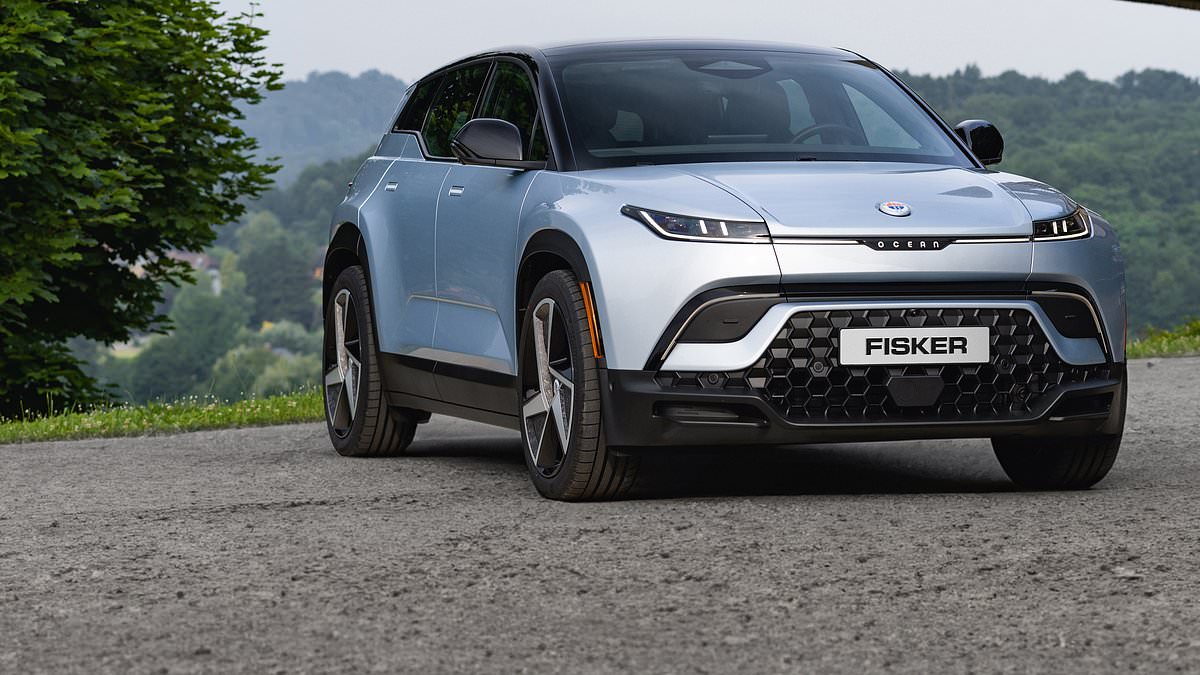Electric car owners face the prospect of being left with useless and unfixable vehicles after a manufacturing firm announced it had gone bankrupt.
More than 200 owners of vehicles made by Fisker could find themselves £70,000 out of pocket – after the Californian-based company declared it had gone bust in June.
A number of drivers say their cars have been plagued with a number of issues – including brake failure, rapid battery draining and the random opening of windows when parked.
But after they reported the issues to Fisker, they found their UK’s representatives to be less and less responsive as the company’s financial situation worsened.
One owner told The Telegraph he ‘feared for his life’ after his Fisker Ocean Extreme, which was advertised as being able to travel up to 440 miles on a single charge, coasted into the middle of a junction after his brakes failed to engage.
But when Kevin Mulligan attempted to get his car’s faults fixed, including the fact it could only travel half the distance he was told it could on one charge, he faced a number of challenges.
He explained: ‘I was talking to one sales guy and then he’d be made redundant. Then I’d be passed to another guy, who put me in touch with the engineer – and then he’d be made redundant. So there’s no on-the-road services or support.’
Leasing companies have now pulled the brand from their listings and the last remaining UK sales centre in Milton Keynes closed down shortly after the bankruptcy announcement.
Mr Mulligan was able to return his vehicle and recoup some of his £70,000 from Santander, through which he leased it.
However, those who bought the vehicle outright may not be so lucky. And if the car’s software updates stop, they will potentially be left in possession of a car that is undriveable.
Fisker’s closure comes eight years after it was launched by veteran Danish car designer Henrik Fisker.
The CEO and his wife each voluntarily reduced their salaries to cut costs to try and save the business, with Henrik dropping his wage to just $1 from $62,400 plus a bonus of $710,000.
The company’s stock price has dropped 85 percent in the month before it filed for bankruptcy.
Fisker, a designer, is also known for leading the development of the BMW Z8 sports car.
He had ambitious plans including a flagship SUV EV called the Ocean which was released in June 2023 and cost upwards of $38,000.
However, attempts to outsource production quickly hit obstacles and Fisker struggled with parts shortages.
At one point, the auto maker had to strip parts from Fisker and his wife’s cars to make repairs to the first batch of Oceans.
The start-up was a flash in the pan in the UK, as it only entered the market last year, with the latest SMMT report showing that 259 cars in total have been registered by Brits this year.
Electric cars are gradually appearing in greater numbers on UK roads as the Government’s ban on the sale of new petrol and diesel vehicles by 2030 gets ever closer.
Many companies have looked to capitalise on the growing demand for these vehicle types – with each one promising longer ranges, sleeker designs and more space.
These new challenger car companies have taken advantage of the market’s relative infancy to rise to the forefront of the sector.
But many like Fisker have faced issues in the fiercely competitive vehicle trade amid weak demand and global supply chain issues.
It has meant companies including Proterra and Lordstown have also filed for bankruptcy in recent years, though they have since been bought out.
Fisker vehicles rely on an internal computer system to run the car, and any operational bugs can only be solved via software updates from the company itself.
In order to diagnose and fix software issues after the company went under, a group of around 40 volunteer owners – Comprising software developers, coders and ex-Fisker technicians – set up the Fisker Owners Association (FOA).
The FOA is now working alongside American Lease, which recently bought Fisker’s remaining inventory and struck a five-year deal, worth $2.5million (£2million), to access vehicle data in the cloud and keep the cars on the road.
The new owners has custodianship over the software and its updates, while the unpaid members of the FOA have essentially assumed the role of Fisker’s service team.
Although the plan is to eventually gain enough trust to have full control over the cloud, FOA’s José De Bardi says the organisation’s future beyond the five-year deal is uncertain.
Mr De Bardi, who runs the European arm of the group, said: ‘We just don’t know at the moment. Most people are happy that at least they will have five years.’
He has told vehicle owners they would still have a useable car if the software updates stop, but ‘you’d just lose all of its digital capabilities’.
But many customers are now trying to get out while they can, after seeing the value of their vehicles plummet by as much as £60,000.
In order to prevent this situation from occurring again, Mr Mulligan wants to see the introduction of more stringent policies from the top down that protect buyers of electric cars.
He suggests a ‘fit for purpose certificate’ issued by a government body that shows it has been thoroughly tested and approved for use on UK roads.
This would mean that if the vehicle did fail, early adopters have a government-backed claim they can take to a financial ombudsman for reimbursement.
But electrical car issues are not unique to Fisker, as Mr De Bardi explains: ‘“This is absolutely a landmark case over connected vehicles and their lifetime and what happens when they’re no longer supported.’
have approached Fisker Inc for comment.
